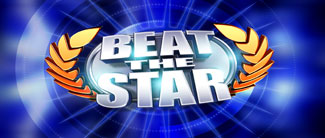Beat the Star
(→Pictures) |
(→See also) |
||
| Line 88: | Line 88: | ||
[[Category:Stunts and Dares]] | [[Category:Stunts and Dares]] | ||
| + | [[Category:German Formats]] | ||
[[Category:Diverse Productions]] | [[Category:Diverse Productions]] | ||
[[Category:Gallowgate Productions]] | [[Category:Gallowgate Productions]] | ||
Revision as of 06:04, 17 March 2023
Contents |
Host
Phillip Schofield (surprise / guest host)
Co-hosts
Commentator: David Goldstrom
Broadcast
Diverse Productions and Gallowgate Productions for ITV1, 20 April 2008 to 31 May 2009 (15 episodes in 2 series + 1 unaired pilot)
Synopsis
Vernon Kay hosts as people from all walks of life have the chance to take on a well-known celebrity in a series of seven (eight from series 2) physical and mental challenges. Should the challenger win, they walk away with the jackpot. If the celebrity wins, they walk away with their reputation intact. Apparently.
The Games
These are the most important part of the show, and are arguably the part that is most in need of attention. The problem is that several of the games are either unoriginal, or seem all a little bit basic. For example, standing on a large human swing, and moving the apparatus backward and forward in the hope of achieving a full 360 degree revolution may be the kind of task you would expect from such a gameshow. However it is hardly original, having been seen at least a decade ago on The National Lottery Big Ticket and Dog Eat Dog. On the other hand, hammering nails into a piece of wood, or seeing who can make a sandwich to a pre-determined weight seem like ideas that should have been left behind at the brainstorming stage. Having said that the majority of the games are fun to watch, and there are some good ones in the mix.
Scoring
Rather than award a point for each event won, the winner of the first event scores one point, the winner of the second event scores two points and so on. This pattern of scoring means that short of a complete whitewash, the person who is behind at any point can still win, resulting in a much closer competition, with the lead changing often.
In the event of a one-sided competition, and either the celebrity or challenger has secured the victory before all the events have been played, extra footage from earlier events is included to cover the time intended for the final event(s).
Prize Money
Without wishing to undermine the value of money, as jackpots go, £50,000 isn't a lot. When Noel and his boxes are potentially handing out £250,000 in daytime, it does seem rather small. However, what made Beat the Star's jackpot more interesting in the first series, was that it could rollover. If a challenger failed to beat the star, the £50,000 jackpot rolled over to become a £100,000 jackpot the following week, and so on until it was won. However while this potentially provided a jackpot more befitting of a primetime show, it wasn't without problems.
The result of having the jackpot rollover meant that one challenger winning one week could win considerably more than another winning challenger another week. For example in an eight-week series, if the jackpot was won in the first episode, but then wasn't won again until the final episode, the first challenger would walk away with £50,000, whereas the final challenger would pocket £350,000. In practice the difference was usually much smaller - £50,000 for one winner, £100,000 for the next, but truthfully, it still didn't seem very fair. Beat the Star was of course not the first show to employ this rollover mechanism for the jackpot - it has popped up now and again throughout gameshow history - but that doesn't necessarily mean it was a good idea.
Perhaps in response to this, a fixed £50,000 jackpot was introduced in the second series if the challenger won. If the challenger failed to win, that week's £50,000 jackpot would rollover to become part of the jackpot for a charity special at the end of the series. This change ensured a fairer deal for winning challengers than the first series did, although at the expense of the shows jackpot being guaranteed to be comparatively small.
Overall it is a good format, with a lot of potential. Vernon Kay is well-suited to the programme, and does a good job of encouraging the participants, but still remaining neutral, and not showing any particular bias to the underdog challenger, nor his fellow celebrity. If a few tweaks could be employed - some more elaborate games to replace the weaker ones for example - and Beat The Star could well fill the void left behind by You Bet! as a large, studio-based, action-packed family gameshow.
Trivia
The first series was filmed at Brainpool TV, the studios used for the German version, in Cologne, Germany. The second series was filmed at Pinewood Studios.
In the final episode of the first series, Vernon Kay was surprised to see Phillip Schofield emerge instead of Iwan Thomas. Only then was it revealed that Schofield would be hosting, and Vernon himself would be the celebrity against whom the challenger would compete.
The celebrities in the first series were:
- Amir Khan
- Darren Gough
- Mark Foster
- Martin Offiah
- Kelvin Fletcher
- Greg Rusedski
- Martina Navratilova
- Vernon Kay
Iwan Thomas was the star on the pilot episode, recorded in November 2007.
The celebrities in the second series were:
- Austin Healey
- Martina Hingis
- Jack Osbourne
- James DeGale
- Rebecca Romero
- Andrew Castle
- Joe Calzaghe and Vernon Kay
Phillip Schofield once again took over hosting duties for the last episode in this series.
Inventor
Adapted from the German format "Schlag den Raab" (Beat the Raab or Beat Your Host).
Theme music
Dobs Vye


